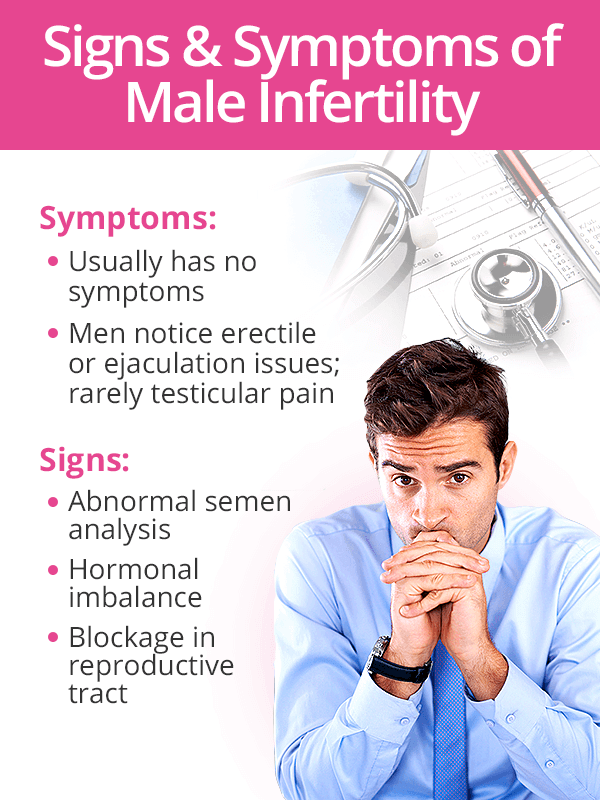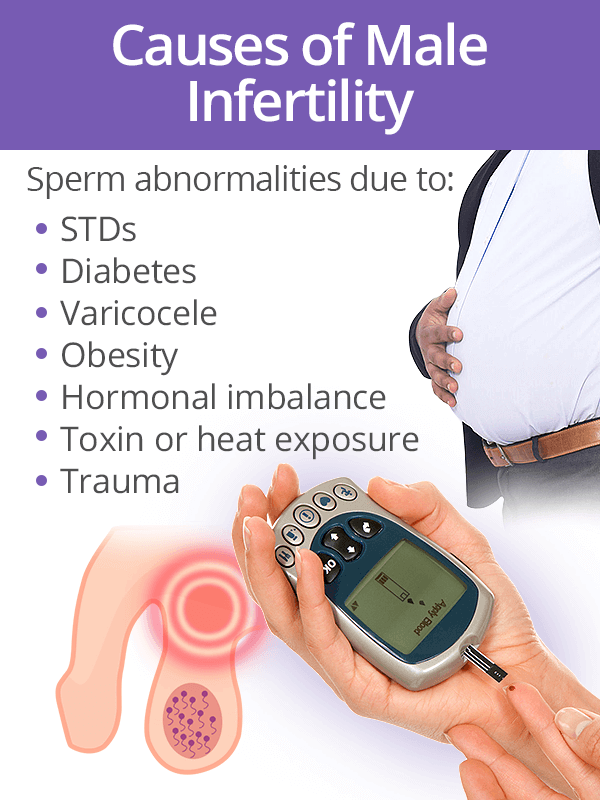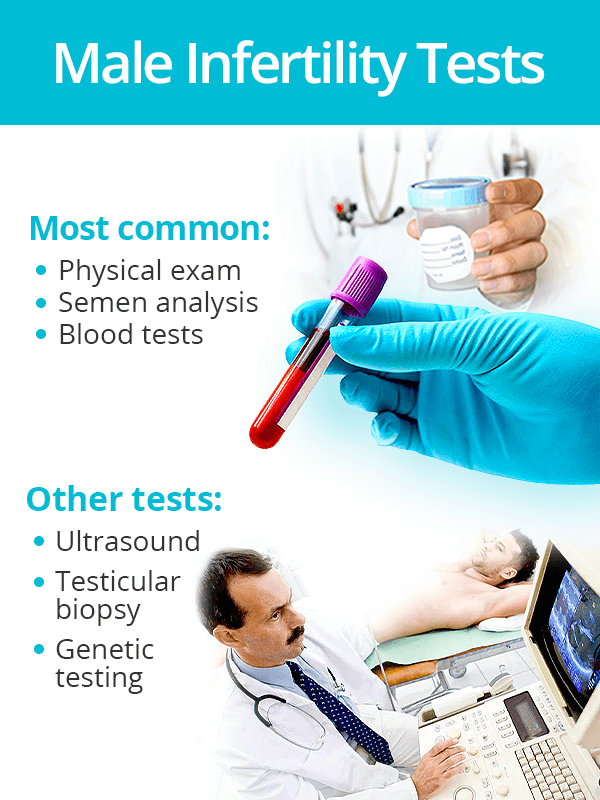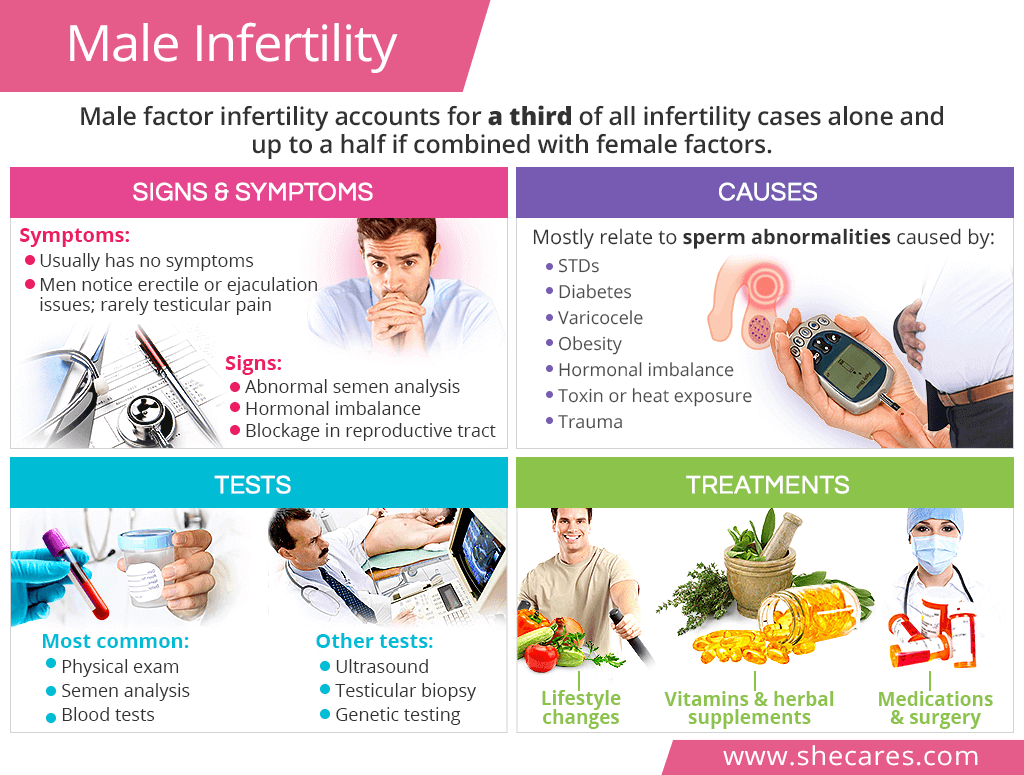Signs and Symptoms of Male Infertility

Symptoms of Male Infertility
Besides not being able to cause a pregnancy, infertility in men does not typically produce obvious symptoms.
Sometimes, however, men notice problems with erection or ejaculation, lower semen volume than before, or a decreased sex drive. Rarely, they experience testicular pain or swelling.
Signs of Male Infertility
The most common sign of infertility in men is an abnormal semen analysis, which shows low sperm count, abnormal morphology, poor motility, or low semen volume. In some cases, abnormal hormone levels can also be used to confirm infertility.
Other signs might include atypical biopsy results or anatomical damage or blockage within the reproductive tract.
Male Infertility Causes

Because male fertility is all about sperm, infertility in men is mostly rooted in sperm abnormalities, including the disturbance in their production, blockages in their transport, and decreases in their function.
Medical Causes of Infertility in Men
- Varicocele
- Uncontrolled diabetes
- Nutritional deficiencies
- Retrograde ejaculation
- Chemo- or radiation therapy
- Genetic disorders, such as cystic fibrosis, Klinefelter's and Kallmann's syndromes
- Hormonal imbalance, such as testosterone deficiency
- Infection or inflammation of the reproductive organs
- Sexually transmitted diseases (STDs), like chlamydia, gonorrhea, HIV
- Medication side effects, including antidepressants, antiretroviral drugs, among others
Environmental Causes of Infertility in Men
- Toxin exposure, including pesticides, insecticides, heavy metals
- Scrotal overheating
Lifestyle Causes of Infertility in Men
- Being over 40
- Abnormal body fat index (BMI)
- Prolonged stress
- Strenuous exercise or sedentary lifestyle
- Excessive alcohol intake and smoking
- Poor eating habits
- Anabolic steroids usage
Male Fertility Tests

When a couple suspects infertility after not being to conceive for a year, both partners are referred for thorough fertility evaluation.
Most Common Male Fertility Tests
An initial diagnostic workup typically includes the following fertility tests for men:
Physical examination to check overall health status, discuss a man's medical and sexual history, and review current medications and lifestyle practices.
Semen analysis is the most important fertility test for men. It is designed to evaluate both semen and sperm's health, including parameters such their count, motility (movement), and shape abnormalities. A semen sample is generally obtained through masturbation, but it might also be done with the use of a special condom during intercourse, according to one's beliefs or preference.
Blood tests give view of a man's overall health, ongoing infections, undiagnosed chronic diseases, and nutritional deficiencies potentially behind low fertility. They can also check the levels of reproductive and thyroid hormones to exclude a possible imbalance.
Other Male Fertility Tests
In most cases, the aforementioned tests provide sufficient clues as to the underlying cause of male infertility. In some cases, however, test results are normal, mandating further testing. Additional fertility tests for men might include:
Ultrasound can produce images of the reproductive organs to rule out anatomical abnormalities, including varicocele, testicular issues, or blockages of the tubes that carry semen.
Testicular biopsy consists of taking a sample of the testicle to verify if sperm production occurs normally.
Post-ejaculation urinalysis is used to rule out retrograde ejaculation.
Genetic testing is usually done as the last resort when previous tests failed to provide clues.
Male Infertility Treatment

With prompt diagnosis and treatment, most cases of male infertility can be successfully treated to enable men to father children.
Treatment methods often begin with natural methods to increase male fertility through lifestyle adjustments and alternative medicine before the use of conventional methods.
Lifestyle Adjustments
- Wholesome diet is essential to maintaining good sperm quality and overall function of the reproductive system. Men should avoid processed foods and excess red meat and opt for food rich in the following nutrients:
- Omega-3 fatty acids: salmon, tuna, sardines, herring, chia seeds, flax
- Vitamin E: almonds, walnuts, spinach, safflower and sunflower oils
- Vitamin C: citrus fruits, bell peppers, tomatoes, kiwi, broccoli
- L-arginine: turkey, chicken, dairy, peanuts, lentils
- Selenium: eggs, brown rice, sunflower seeds, brazil nuts
- Zinc: pumpkin seeds, poultry, oysters, whole wheat
- Vitamin B: spinach, kale, asparagus, peas, nuts, clams, eggs
- Regular exercise can prevent the detrimental effects of a sedentary lifestyle on sperm count and quality. Men should focus on moderate level activities, such as running, hiking, or swimming, and avoid over exercising or heavy weight lifting.
- Healthy habits beneficial in boosting men's fertility include:
- Quitting smoking and avoiding alcohol
- Reducing stress with meditation or breathing exercises
- Wearing loose underwear can also help men prevent overheating
- Having regular intercourse is key to keeping sperm healthy as well
Vitamin & Herbal Supplements
Besides a nutritious diet, men can take advantage of various natural supplements shown useful in boosting male fertility. They include the following:
- Vitamin and mineral supplements can help fill in nutritional gaps and restore proper functions of the reproductive system, including improving sperm motility and count as well as ensuring their normal shape and function.
Zinc, selenium, arginine, L-carnitine, and vitamins B9, B12, C, and E
- Herbal supplements are made from herbs that have been long recognized for having fertility-improving effects in men by increasing sperm motility and count, helping regulate testosterone levels, and improving libido, among others.
Astragalus, saw palmetto, ashwagandha, sarsaparilla, ginseng, horny goat weed
Conventional Medications & Surgery
The choice of conventional treatments depends on the underlying cause of male infertility. If there are unresolved medical conditions, the treatments would be tailored towards their specific management.
Medications might include antimicrobial drugs to treat STDs or hormone medications to regulate treatments.
Surgery is sometimes necessary to correct varicocele, remove blockages in the tubes transporting the sperm, or undo a vasectomy.
Assisted reproductive technologies (ARTs), such as artificial insemination (AI) or in vitro fertilization (IVF), are used to enable men with unexplained infertility or ineffective previous treatments father a child.
Key Takeaways
Despite common misconceptions, infertility is as equally prevalent in men as it is in women, accounting for about a third of all cases alone. Those with underlying infertility often remain unaware of their condition until a year of unsuccessful conception efforts as it rarely produces obvious symptoms. Male factor infertility mostly lies in disturbances with the production, transport, or function of sperm, which can be caused by a number of conditions, including STDs, diabetes, varicocele, and hormonal imbalance. Fortunately, men have a wide array of infertility treatments at their disposal, which range from lifestyle adjustments and vitamin or herbal supplements to medications or surgery to resolve the underlying causes.
Sources
- American Journal of men's Healthy. (2017). The Impact of Intense Exercise on Semen Quality. Retrieved from November 22, 2018 from https://www.ncbi.nlm.nih.gov/pmc/articles/PMC5675222/
- American Pregnancy Association. (2018). Male Infertility. Retrieved from November 22, 2018 from http://americanpregnancy.org/infertility/male-infertility/
- Human Reproduction Update. (2017). Dietary patterns, foods, and nutrients in male fertility parameters and fecundability: a systemic review of observational studies. Retrieved from November 22, 2018 from https://www.ncbi.nlm.nih.gov/pubmed/28333357
- Eunice Kennedy Shriver National Institute of Child Health and Human Development. (2017). What are some possible causes of male infertility? Retrieved from November 22, 2018 from https://www.mayoclinic.org/diseases-conditions/male-infertility/symptoms-causes/syc-20374773
- Mayo Clinic. (2018). Male Infertility. Retrieved from November 22, 2018 from https://www.mayoclinic.org/diseases-conditions/male-infertility/diagnosis-treatment/drc-20374780
- Medline Plus. (2018). Male infertility. Retrieved from November 22, 2018 from https://medlineplus.gov/maleinfertility.html
